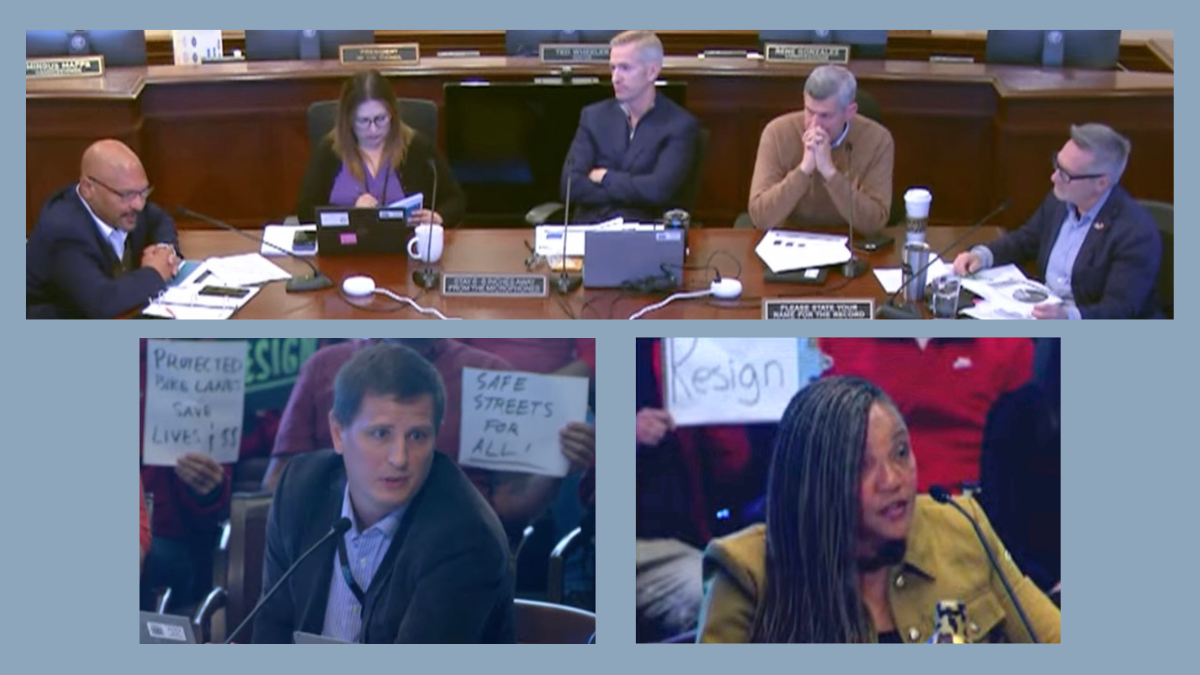
Sunday Parkways, Safe Routes to School, the 823-SAFE hotline, basic maintenance, 127 full-time jobs, landslide cleanup — yes landslides! — were are all put on the chopping block in City Council chambers this morning as the Portland Bureau of Transportation presented its budget at an annual work session.
Commissioner Mingus Mapps, PBOT Director Millicent Williams, and top-level staff painted a bleak picture for Mayor Ted Wheeler and the rest of council. It was the first major public step in the agency’s journey to cut nearly one-third of its discretionary budget — or find new revenue to prevent an unprecedented reshuffling that would be felt by PBOT and throughout city government.
But what was that about landslides?
“We are eliminating all landslide repairs and any major emergency repair work on structures,” said PBOT City Engineer Todd Liles as he laid out cuts under consideration by the Engineering Services group he manages.
“What does that mean?” Mayor Wheeler asked.
“They’ll sit there,” Liles replied. “We need to come up with some money to do that.”
“Sorry I asked,” replied the Mayor.
If you’re shocked at the level of cuts under consideration, consider this: PBOT’s budget looks big on paper when you see the $509 million top-line figure. But just $147 million of that is actually available to the bureau to use as discretionary (no strings attached) funding. And even within that $147 million slice of pie, about $48 million is tied up in debt service and other commitments.
That leaves just $99 million left to run the 800-person agency, implement programs, maintain the 5,000 lane miles of roads, 159 bridges, 60,000 street lights, and so on. This year, PBOT is being asked to cut $32 million from that $99 million in order to balance their books. That’s because of a perfect storm of factors that includes a loss of revenue from parking fees and gas taxes (pushed down further due to the pandemic) and a big increase in material and construction costs due to inflation — and it follows five years of difficult belt-tightening.
The budget is so bad that PBOT has been asked to rewrite their strategic plan, because they cannot fulfill their current plan with the funding they have.
Director Williams, who sat in front of a sign that read “Resign” that was held by someone protesting her involvement in the Broadway Bike Lane scandal, put the situation in simple terms: “We either cut $32 million from the $99 million available next year, or find a solution or combination of solutions, to fill the gap. If we must make a $32 million cut, you will not have the Portland Bureau of Transportation as you see today.”
After Williams laid out the problem for council members, managers of PBOT’s seven different groups shared the specific cuts and layoffs they would be forced to make.
But before I get into that, Williams was asked a notable question by Commissioner Rene Gonzalez.
“I ride my bike or take the train 90% of the time downtown,” Gonzalez said. “Are [car] drivers subsidizing me in our current revenue model? I pay for my bike in maintenance but I don’t pay a fee to to bike every day. My TriMet pass has been provided to me at less than I think the cost of my usage is in a year. So that’s the question: am I being subsidized by drivers?”
“Yes you are. Yes,” replied Director Williams.
“So what’s the solution? How do we better reflect the cost of supporting cyclists and those who use public transit?” Gonzalez asked.
Williams then said it’s a “complex conversation” and then listed a few ideas on how to adress it. “There are a number of ways that we could get to having the whole of community supporting the transportation network,” she said. “So there are more opportunities for us to explore and discuss that with you.”
More strategies for raising revenue were discussed later in the work session, but let’s get back to the cuts.
Below are the slides that went with each group director’s presentation about their planned cuts:
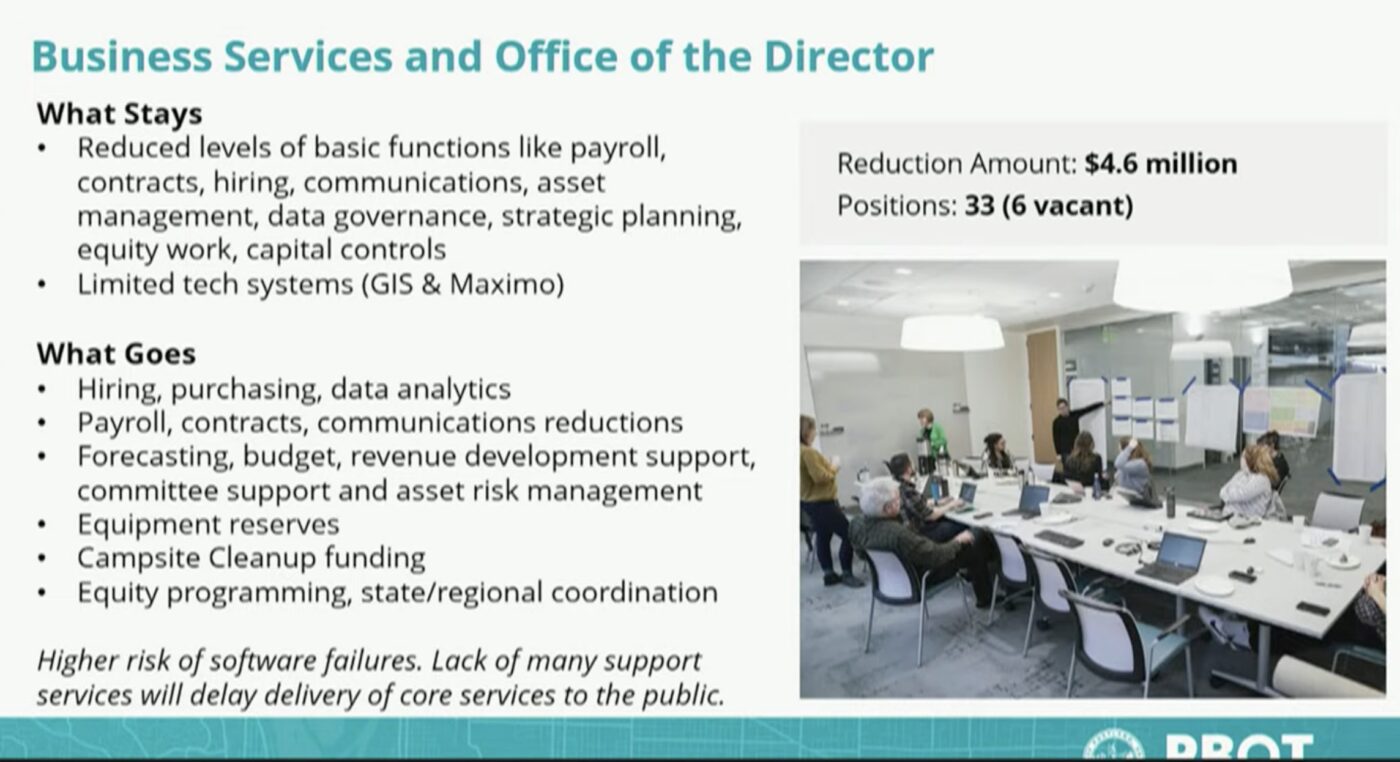

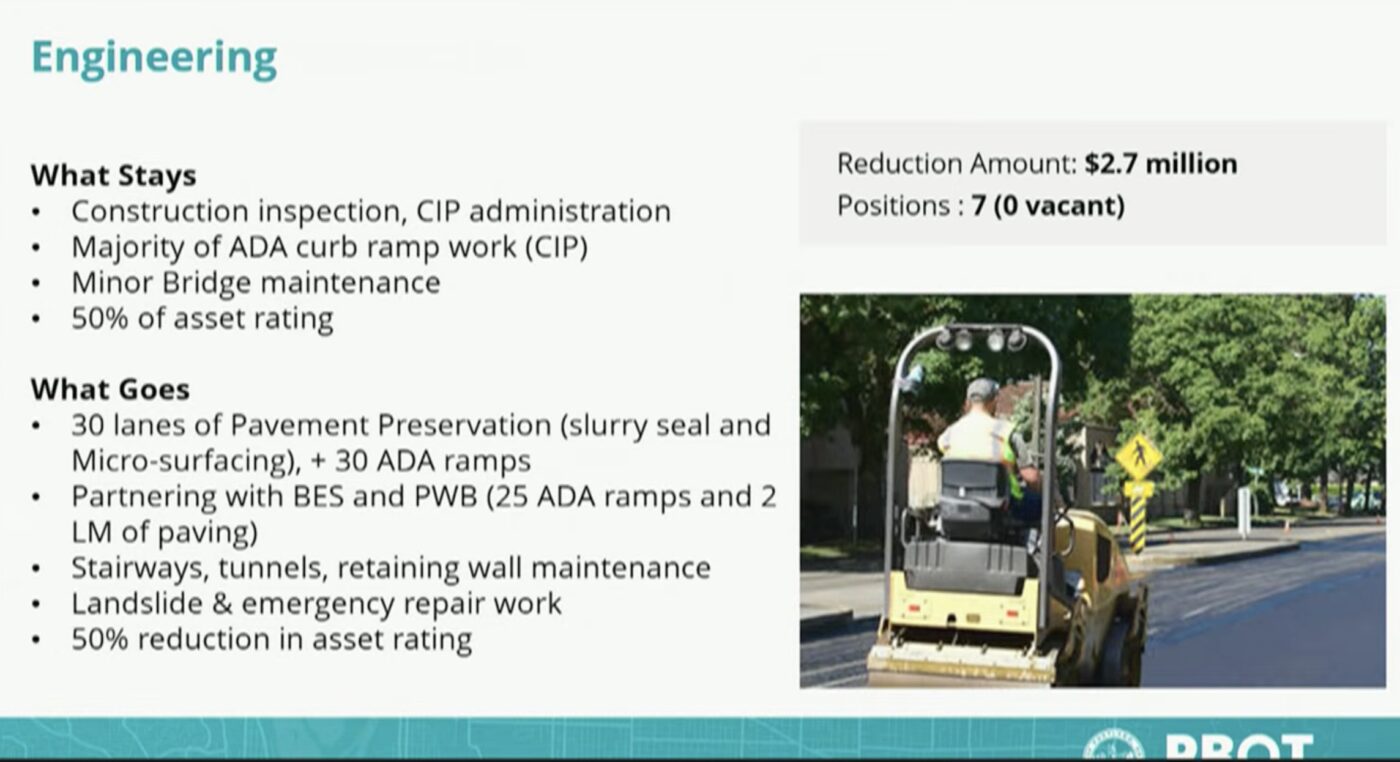
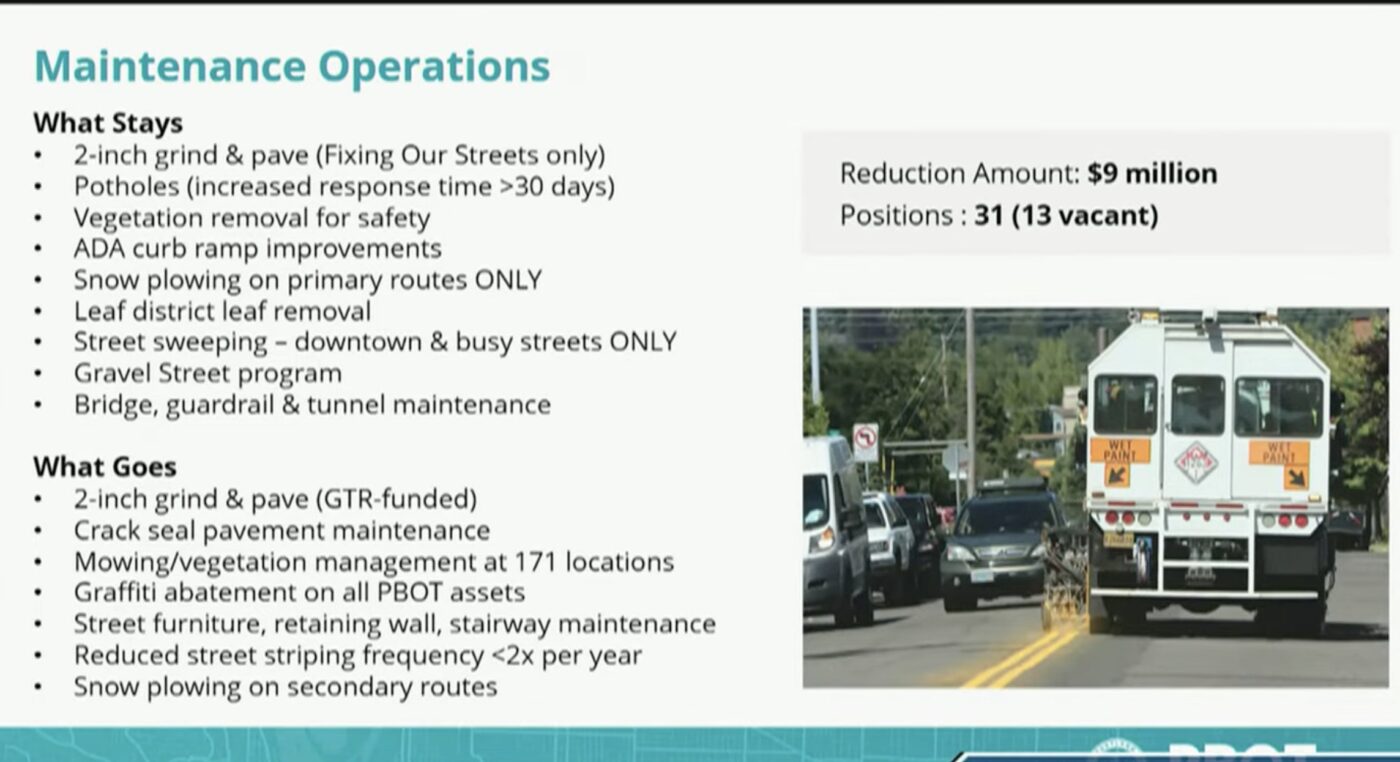
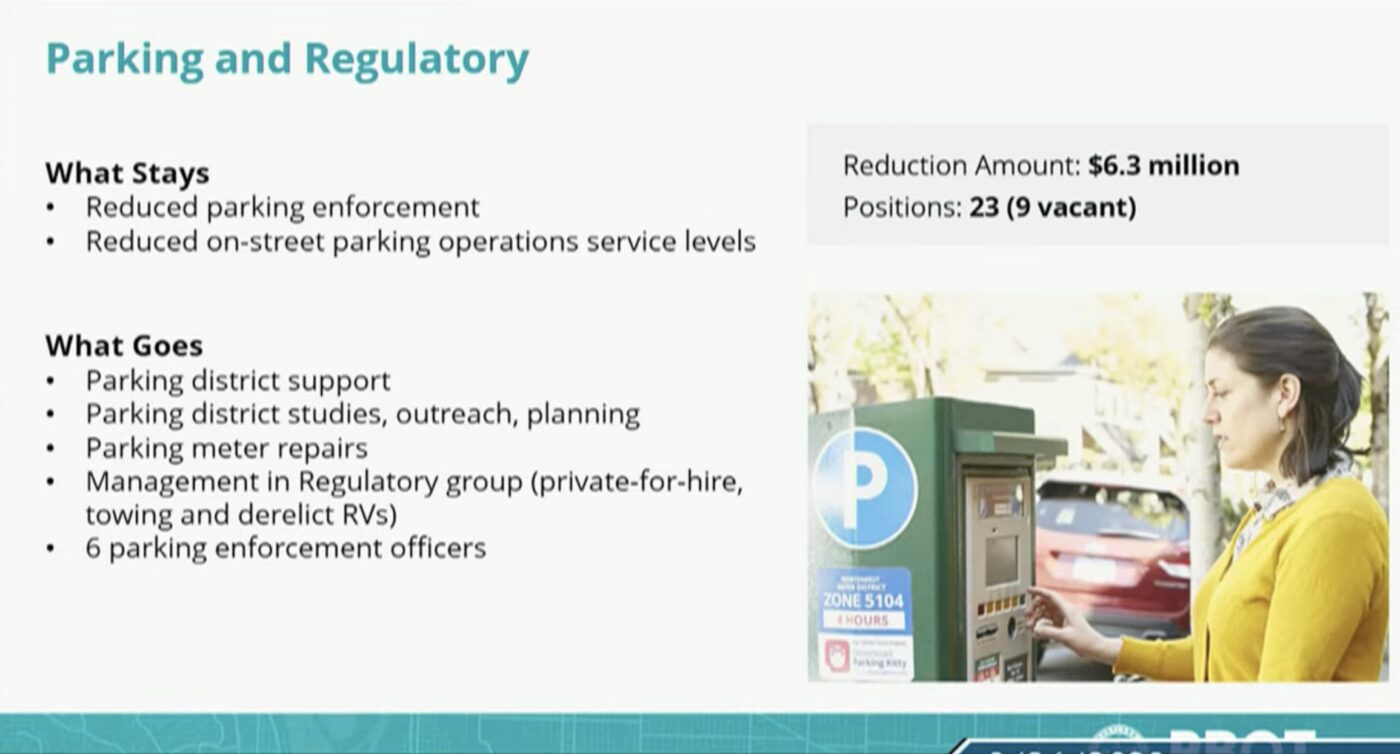
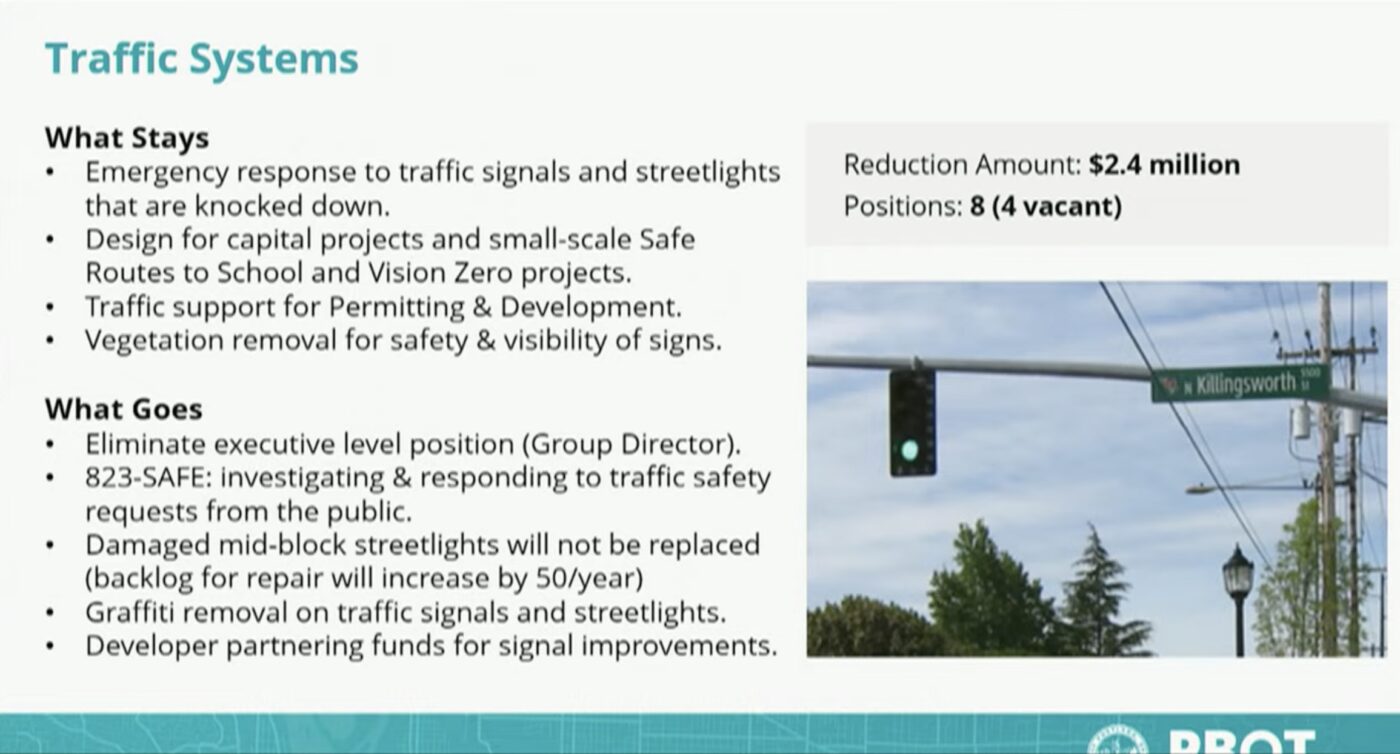
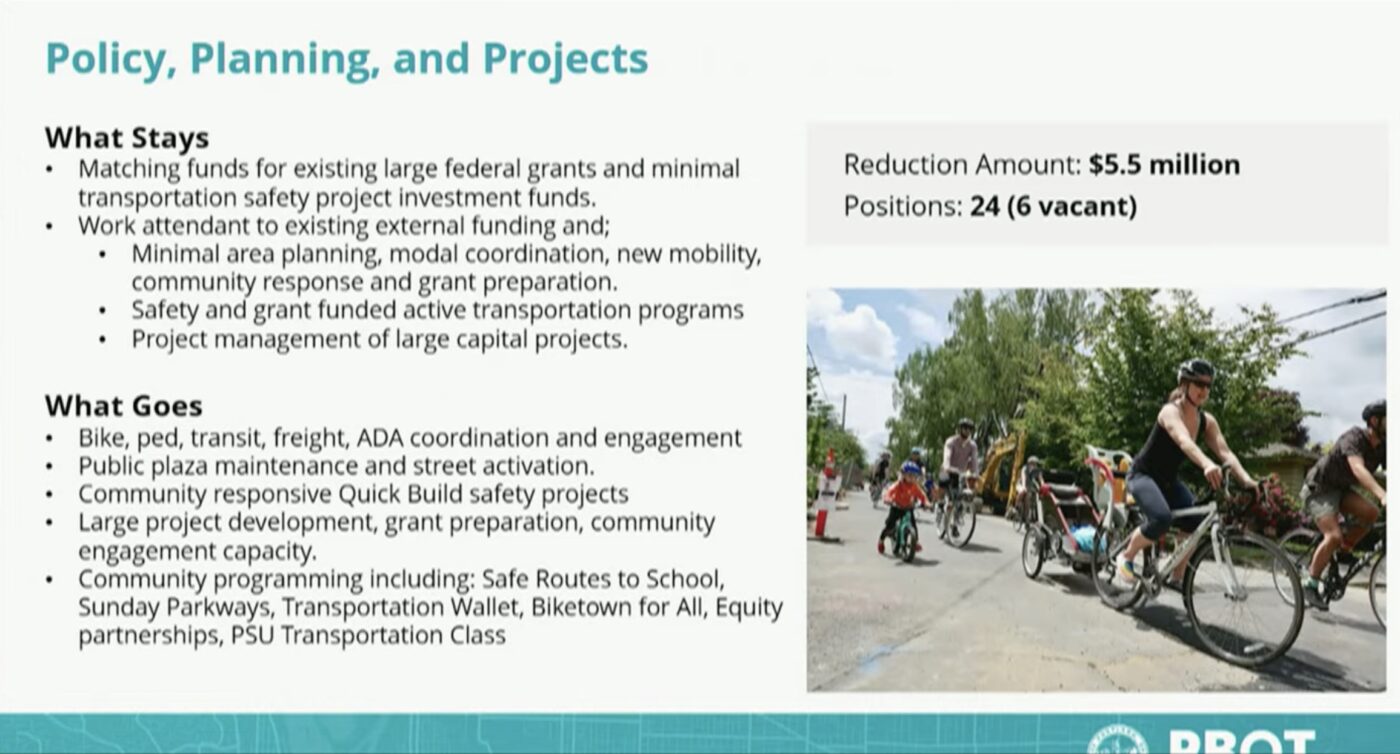
As you can see, there are some very notable cuts and layoffs on the table. They include:
- Removal of subsidies for street fairs, community events, farmers markets, etc…
- Reduce funding for Portland Streetcar
- Complete reduction of stairway and tunnel maintenance (will only do structural repairs)
- Elimination of all landslide and other major emergency repair work
- 50% reduction in street paving
- Less vegetation management (meaning more branches and bushes into the bike lanes)
- Reduction of snow plowing and lane striping
- Dozens of family-wage jobs
- Laying off six parking enforcement officers
- PBOT would no longer support its three modal committees (Bicycle, Pedestrian, Freight)
- Time to respond to key project grants
- Sunday Parkways and other popular programs
- 823-SAFE public safety requests and investigations
- Fewer damaged, mid-block streetlights will be repaired
- and so on and so forth.
No one on council wants to see these cuts happen. Since so much of PBOT’s work is connected to other bureaus, there would be ripple effects felt citywide. What can be done about it?
There was a lot of talk about how PBOT might tap into some of the $750 million Portland Clean Energy Fund Climate Investment Plan. That plan will be adopted by council at their meeting tomorrow and PBOT (along with other bureaus) are circling around it like vultures. PCEF is already going to fund PBOT’s Transportation Wallet program, but will PCEF’s advisory committee support a larger ask from PBOT? That remains to be seen.
The end of PBOT’s presentation to council was the big ask for new funding sources.
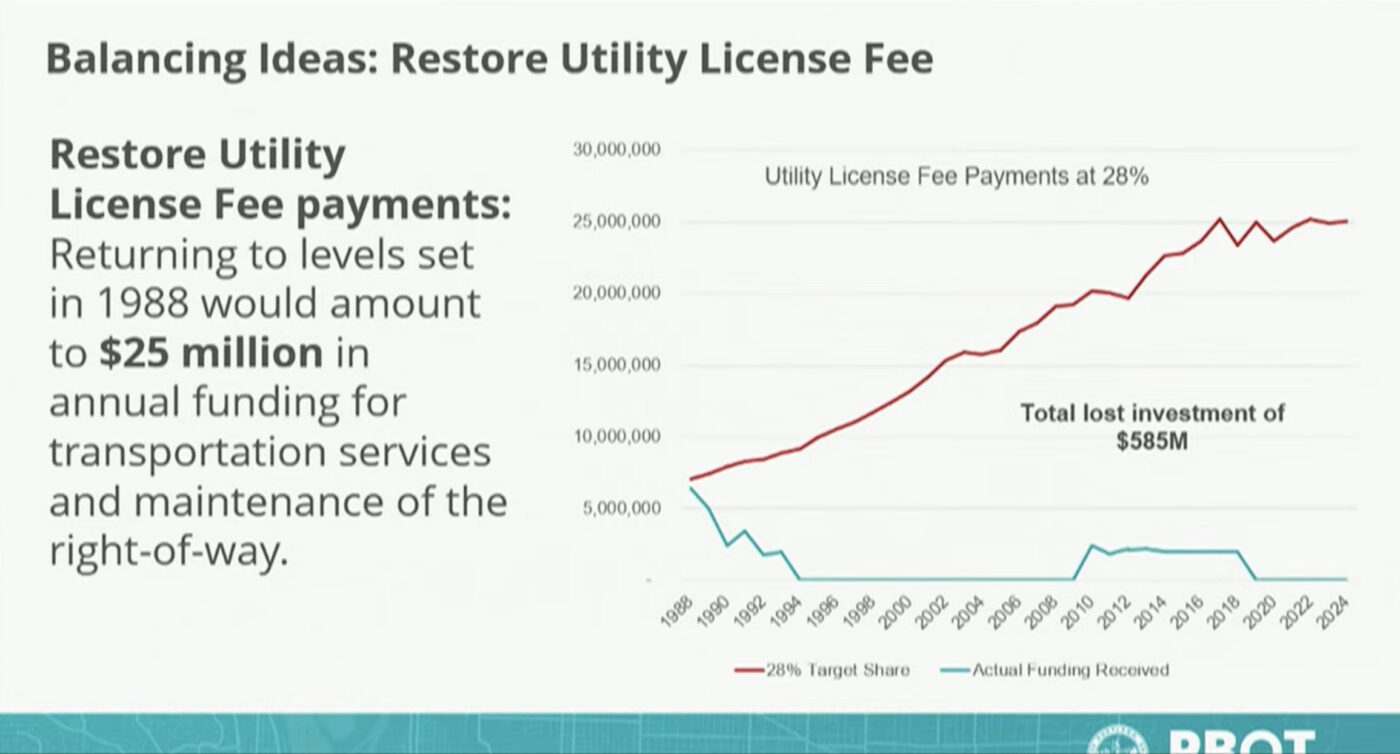
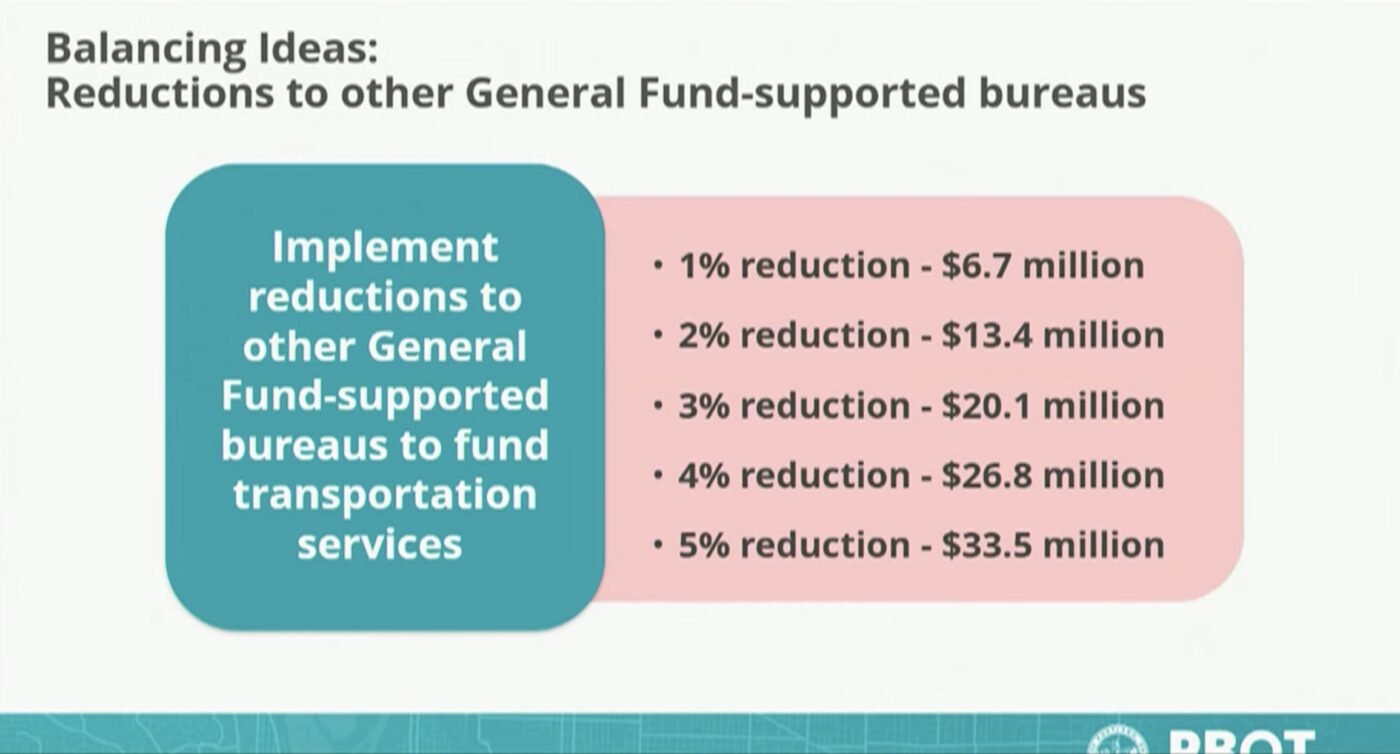
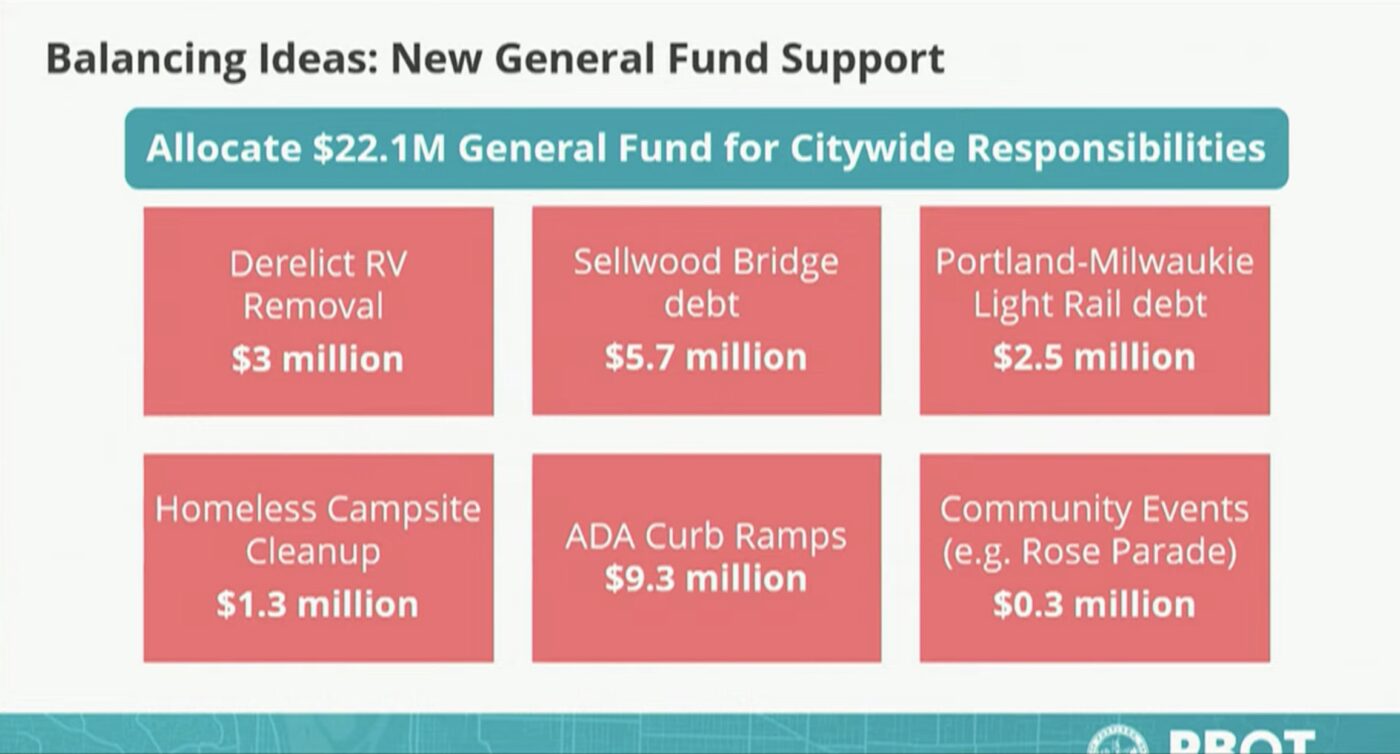
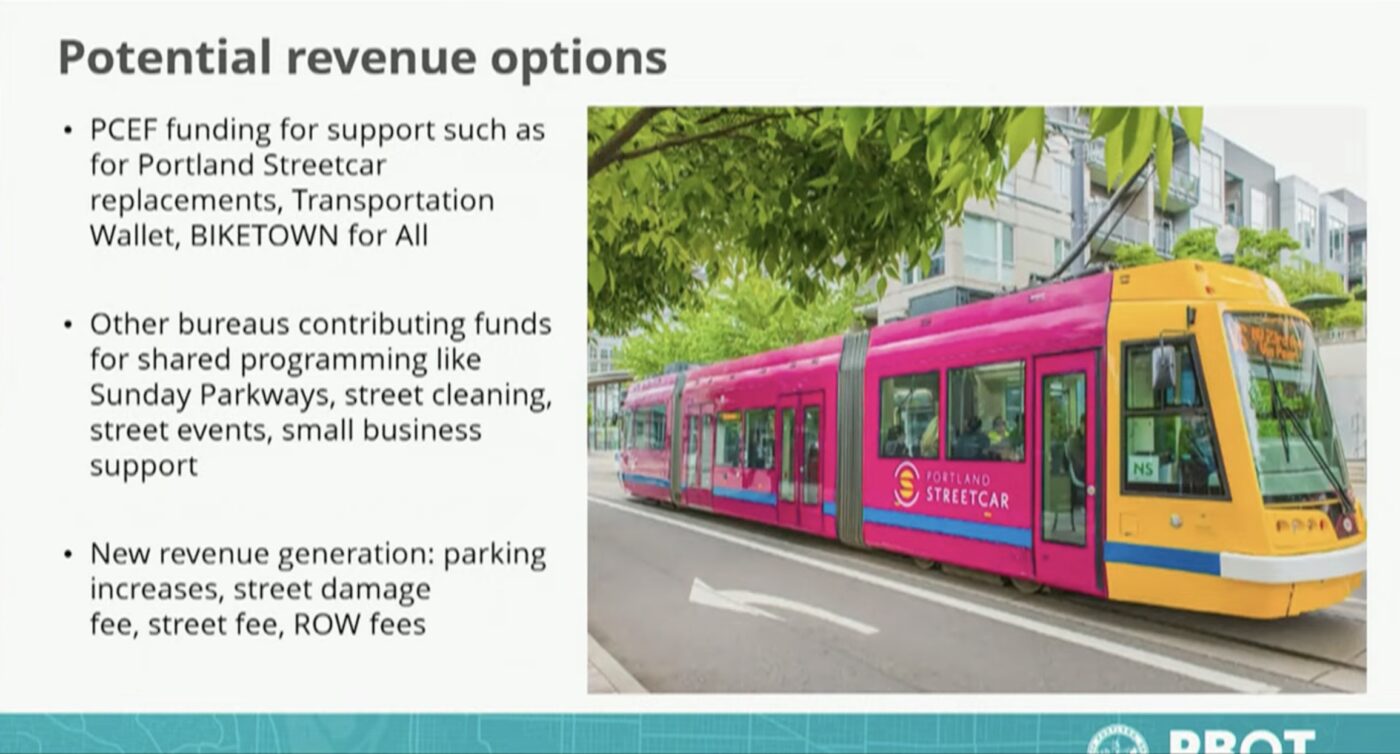
A big one PBOT is targeting is the Utility License Fee (ULF), which are fees collected by the city from utilities that use the right-of-way (a natural relationship to PBOT). Back in 1988, when transportation funding was separated from the city’s General Fund, PBOT was promised 28% of this fee as a replacement. But over the years, these funds were siphoned away into other bureaus. PBOT estimates they’ve lost $585 million since 1988 and they want some of this money back. In a slide shown by Director Williams, PBOT expects they could net $25 million per year if council restored the ULF to 1988 levels.
“This restoration could be directed by council now to avoid PBOT cuts,” Williams said. “But yes, there would be an impact on other bureaus.”
As expected, PBOT also made an ask to reduce other bureaus’ funding from the General Fund in order to pay for transportation. If all other bureaus reduced their General Fund budget by 1%, PBOT could receive $6.7 million. A 5% reduction would net PBOT $33.5 million.
Offloading certain annual expenses — like homeless camp cleanup ($1.3 million), Sellwood Bridge debt ($5.7 million) and derelict RV removal ($3 million) — could result in an additional $22 million for PBOT.
These are just some ideas PBOT floated at the work session. Now the real negotiations and debates will likely begin among Mayor Wheeler, Commissioner Mapps, and the rest of council to come up with a solution.
While Wheeler and Commissioner Gonzalez said they would absolutely not support using any Public Safety funding for PBOT, it sounded like there was a genuine interest from all five members of Council to collaborate on this crisis.
“What I can do in my role is to be transparent with you,” Commissioner Mapps said in his closing remarks. “And today is the beginning of that dialogue.”



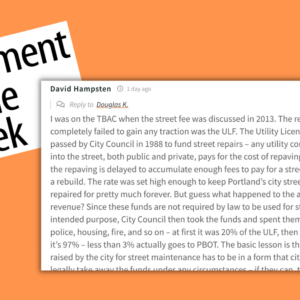

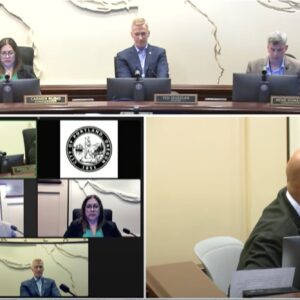
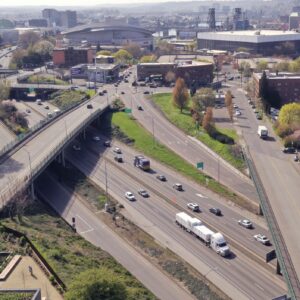
Thanks for reading.
BikePortland has served this community with independent community journalism since 2005. We rely on subscriptions from readers like you to survive. Your financial support is vital in keeping this valuable resource alive and well.
Please subscribe today to strengthen and expand our work.
I’ll just point out between this story and the outrage over Mapps & Williams prioritizing businesses over active transportation that no one on BP should be surprised unless you’ve had your head buried in sand. Portland is NOT on the road to recovery. It’s on the path to become the next Detroit. PBOT is now considering layoffs due to lack of funds especially the lack of parking revenue downtown. And now Target announcing today it’s closing 3 stores including the downtown location due to crime and safety concerns. Is it any wonder why almost every politician is standing in line to cater to the concerns of the business community? They see that as their path to getting elected or re-elected.
This is such a horrible take, I don’t even know where to begin. The problems facing Detroit are things like massive industrial divestment coupled with a history of extreme neglect (typically motivated by racism) from the state. Portland is not anything like Detroit.
Mapps & Williams are prioritizing businesses in the sense that they are taking campaign handouts from the PBA to do the projects that the rich and powerful on the PBA want. I don’t think it’s accurate to even characterize that as prioritizing businesses! When PBOT canvased the businesses on Broadway in the aftermath of this project, no concerns were brought up.
And concerning Target, they may cite crime and safety but the smaller stores (which are the ones that are closing) were also a significant departure from their classic niche. They had higher prices, which functionally eliminates most of the benefit of going to a place like Target anyways. I don’t doubt that crime and safety play a role in the abstract, but I have a hard time believing just the corporate line.
The lengths some BP readers go to paper over Portland’s problems just amaze me. Simply label it as a bad take and move on, nothing to see here. If you honestly believe Portland’s best days are just one election away then you’re living in denial. And the entire Portland and Multnomah County political establishment has been living in denial since rioters, protesters and homeless non profit organizations were given the keys to the city. It only took a couple of years to get to where we are today. It will take a decade or longer to dig ourselves out of this mess.
The lengths some conservative readers go to paper over Portland’s problems just amaze me. They read a logical rebuttal and then read it as a bad take, nothing to see here. If you honestly believe Portland is on the same path as Detroit, then you are living in denial. And you are ignoring the fact the entire Portland and Multnomah County political establishment (including the police) has been undermining itself with infighting, self-sabotage, and the lack of any sort of vision. It only took a couple of years to get where we are today. It will take a decade or longer to dig ourselves out of this mess that City Hall and the police have dug us in.
The comparison with Detroit stands on its own merits when it comes to people and businesses fleeing the city no matter what explanations you want to give. It all comes down to tax money and you eventually run out of “other people’s money” when there’s no businesses, residents or tourists left to tax (see Portland and Multnomah County population declines). Hence the real reason PBOT is having budget issues. They haven’t managed their budget properly and there’s declining revenue due to Portland’s decline.
This seems to reinforce the comparison to Detroit: dysfunctional, ineffective government leading to a breakdown of social systems
“We are all Detroit” according to Strong Towns because of our failed experiment in auto-oriented development. This is all immensely sad, but it’s not surprising.
Thank you for the link, Stephinitely, that was a really good essay.
I largely agree with you, but I do not share your skepticism about Target. I am not a fan of Target, but I have run in their about once a month over the last couple of years. It is an absolute shitshow On Morrison in front of the store. Every time I go there is a crowd of people (5-12) openly smoking and selling drugs and loudly discussing what they managed to steal from Target. I was 5 feet away from a group of guys about 6 weeks a ago who completed a drug sale that included some stuff just stolen from Target while I locked up my bike. I walked up Yamhill from the river this past Monday evening to check out the new streetscape on 9th. I have been telling the haters that I know that Portland has been cleaned up a lot and downtown is looking pretty good…but what I saw on Monday was disconcerting. I saw at least 20 people smoking out of tin foil! Multiple couples and singles per block just opening smoking drugs. FWIW< I 100% believe Target’s claims of theft and bad behavior- I have experienced it every single time I visited that store.
When the director of transportation thinks motorists are subsidizing anyone (when the plain facts of reality are that motorists are subsidized by everyone) there’s no hope.
Until BikePortland readers become elected to office and right the ship down we go.
Is this true in Multnomah County? Does any portion of the local property taxes still go towards roads? Looking through the PBOT funding sources I don’t see funding from property taxes. Isn’t this why it is such a fight to get safety projects completed because there is no longer a local source of funding outside of gas taxes, parking fees, and licensing.
Really noticing that this seems to be the newest pro-car talking point that’s spreading around the city, this idea that cyclists are somehow a burden on the system when we pay our state taxes like everyone else and cars are the ones the infrastructure is built for and also the source of the majority of the maintenance costs. Feels like some sort of counter-narrative needs to be defined and pushed before this becomes “common knowledge”
Gosh, would they really get rid of the Freight Advisory Committee?
*taps sign*
Where has this been all my life????
I got it from Brent Toderian:
http://web.archive.org/web/20230425055009/https://twitter.com/BrentToderian/status/1650608947357974535
Why are you bringing density into the argument? Are you saying high density = low taxes? Tell that to New Yorkers!
Much of New York City is not especially dense, e.g. Queens. The point is that you can’t provide a high quality of life in a city *without* a sizable tax base. You get that by either raising taxes or increasing density.
“The point is that you can’t provide a high quality of life in a city *without* a sizable tax base. You get that by either raising taxes or increasing density.”
Or improving the business environment so people will want to build businesses here, bringing investment and energy to the city.
“Improving the business environment” usually translates to cutting taxes on the wealthy and throwing poor people in prison. Which doesn’t do much for quality of life except for those at the very top.
There are cities around America and around the world that are recovering brilliantly after a few years in COVID lockdowns. Those are cities that have prioritized people first, not cars first.
PBOT is on the hook for maintaining 25% of the property in the City of Portland, and the “asset” the agency has to fund maintenance is its streets.
If streets have to carry all kinds of heavy vehicles in all places at all times for free (yes, PBOT gets minimal fractions of gas tax and fractions of the $2/hour curb use at a few spots for a limited time) there’s never going to be enough in the budget to pay to maintain streets, let alone improve them.
Pricing Options for Equitable Mobility POEM worked through some excellent ideas for revenue generation from streets. More are needed. But free car use on all streets at all times should be a non-starter.
I’m also concerned that PBOT has a poor record of getting state and federal funding from the Infrastructure Investment and Jobs Act (IIJA). Please keep PBOT lobbyists and grant writers on staff and hire more!
This is such BS. Are cyclists doing $700k in damages a year to existing infrastructure? How much of road maintenance and cleanup is for the damage caused by drivers vs cyclists? Of the $360 million of their non-discretionary funding how much goes to capital infrastructure for drivers rather than cyclists? Oh lets not forget most cycling infrastructure is only necessary because of how dangerous drivers are so that’s not really cycling infrastructure.
They’re either both clueless or craven liars trying to put this shortfall on other modes.
Also lets talk about that $360 million. Why are we continuing down this path? Can the state and federal government really not just change their rules for that type of funding and allow if not require municipalities to fix their existing infrastructure with that money before building more infrastructure? It’s absolutely madness and a problem across the country at the state, county and city levels.
I agree, chump move on Gonzalez part, and if the commissioner had an
Opportunity to take the high ground and instead stooped to his level. I’ll bet you $100 that Gonzalez would not have gone there if there wasn’t a crowd of BikeLoud spectators in the audience dressed in red shirts and holding protest signs. He was flexing, pure and simple, and commissioner Williams joined in. It was an immature move from an elected official in a public meeting doing the people’s business.
I’m sure they’re counting “replacing bollards and curbs” as part of the cost of bicycle infrastructure, when the damage to those is caused by cars.
And actually, the even crazier thing is that much of “bicycle infrastructure” exists primarily to mitigate dangerous conditions on roads caused by drivers.
I mean, its kind of what I’d expect from a republican. Critical thinking is not in their wheel house.
The City should pay people to bike instead of drive, it would ultimately save them money.
The more egregious part of that exchange is the head of PBOT agreed with Rene’s brain dead take.
I can’t wait to jettison this city council into the sun.
“I drive my SUV 90% of the time downtown. Are [car-owning bicyclists and the federal government and other] drivers subsidizing me in our current revenue model? I pay for my SUV in high-interest loans and maintenance but I don’t pay [much of a registration fee] to drive and cause road damage, and park everywhere for free every day. My Constitutional Vehicles Rights pass has been provided to me at less than I think the [true environmental and societal] cost of my usage is in a year. So that’s the question: is my motor vehicle habit being subsidized by the environment and everyone and everything else?”
“How much of road maintenance and cleanup is for the damage caused by drivers vs cyclists?”
If we’re naming names, it’s mostly trucks and buses.
Do we trust these leaders to make PBOT whole in a way that won’t further erode public trust and our community’s quality of life? *side eye*
When did these ominous clouds first appear on the horizon? Something tells me this PBOT apocalypse could have been forecasted more than a year ago.
Also, I think the concerns of hotels and Uber drivers being disconcerted by the bike lane on Broadway can take a backseat till City Hall can figure out how to avoid the bankruptcy of a core city function.
What a chump comment from Gonzales. Same with the response from Williams. Cyclists aren’t being subsidized by drivers (as many here are well aware). For one, most of them are drivers. But additionally, every cyclist that commutes by bike instead of driving saves PBOT money. It’s the other way around. Cyclists are subsidizing drivers.
And it’s ironic that they’re literally talking about ignoring landslides while somehow they can seem to find the money in the couch cushions to remove a bike facility on Broadway.
Williams seems to be talking entirely about the discretionary budget funded by user fees from drivers, ignoring the hundreds of millions PBOT gets from state and federal grants for capital projects.
Nailed it.
Today’s OregonLive headlines are;
Top headline:
“Will massive clean-energy fund take Portland to its climate goal? No – and that’s not its objective”
“The Portland City Council is expected to approve $750 million in climate-action projects from the massive Portland Clean Energy Community Benefits Fund.”
And second headline:
Portland transportation bureau to propose $32 million in budget cuts
Seems that maybe some of the $750M could be used to sweep bike lanes, fill potholes, clear storm drains, replace missing bike lane stripes, remove graffiti from signs on bikeways, replace missing candlestick bollards, trim tree branches from bike lanes, cut back blackberries from paths, pick up garbage from paths, and maybe even make some improvements to the bicycle infrastructure to help reach climate goals.
The theory being that people are less likely to ride their bicycles if they need to dodge potholes, tree branches, errant car drivers, puddles, garbage, etc…
Just a thought,
Ted Buehler
I agree, Ted. More cycling = cleaner air and less warming.
Bicycling is climate action.
Portland’s sector based transportation emissions (Portland Climate Action Progress Report): 42%
Percentage of transportation emission from passenger cars/vans (EPA): 48%
Portland cycling mode share (Census ACS): 3.2%
.
Estimate of transportation emissions reduction from people cycling in Portland: ~0.6% (42%*0.48*0.032=0.6%)
.
Claiming that riding a bike is climate action is akin to claiming that banning plastic straws is plastic pollution action.
.
What a joke, I pay many thousands in local property taxes every year and drive very little because I mainly bike. The idea that motorists are subsidizing me is nothing short of absurd.
https://www.portland.gov/cbo/2023-2024-budget/documents/portland-bureau-transportation-fy-2023-24-requested-budget/download
There’s the budget, take a look for property taxes as a funding mechanism for PBOT, if you find it, let us all know. If it wasn’t this way, do you really think $32MM would be the problem it is?
That Gonzalez question was obviously a preplanned soft ball. Mapps and Williams are embarrassing for Portland.
Who won’t be coming to stay in Portland hotels?
People from other cities wanting to learn how to improve their transportation systems.
It’s telling that PBOT’s core business is car mobility. Everything else is a nice to have add-on program that can just be cut as some kind of frivolous expenditure.
We definitely have enough money to reconfigure Broadway (with night work!) though!
In regard to subsidization of bikers by drivers, remember also that quite a bit of bike riding is done on paths (Springwater, Willamette Greenway) that are owned and maintained by Parks, meaning they don’t cost PBOT anything, and their funding isn’t coming from gas taxes or vehicle fees. It’s coming from property taxes that people riding bikes pay.
Fire half of PBOT employees who don’t directly perform work on the ground. They’ll cut everything but the bureaucracy.
Long-term, we need more general fund money for road maintenance. Parking and gas taxes are not stable.
Nope.
Parking could raise more money, especially if we had the political will to charge for curbside parking – that’s public space where we’re letting most people store their vehicles for free.
The gas tax needs to be replaced by a mileage tax, and the rate per mile flexed based on vehicle weight.
And tolling should never be taken off the table. You want a new bridge? Wider freeway? Pay for it.
There are all kinds of ways to get the people driving the vehicles to pay a higher share of the cost of maintaining vehicle infrastructure without taking it out of the general fund. But no one in Salem has the backbone to go there.
in addition to the local budget, PBOT get grants (revenue source is federal income tax, gas tax and other taxes to build roads, freeways etc. IBR? )
METRO is the Planning Organization for the region and they say the Regional Transportation Plan about to be adopted in November WILL NOT MEET THE REGIONS GOALS for WALKING BICYCLING and TRANSIT.
see page 18 aka 22/46 of this document: https://www.oregonmetro.gov/sites/default/files/2023/08/01/2023-RTP-Executive-summary-20230731.pdf
When is someone going to ask how do pedestrians pay for sidewalks or how commissioners get their money to run for office?
Also, developers build streets and roads because the city demands it.
LIBRARIES ARE FREE
STREET LIGHTING IS FREE
STREET TREES ARE FREE
PARKS ARE FREE
POLICE & FIRE ARE FREE
FARMER’S MARKETS ARE FREE
SUNDAY PARKWAYS ARE FREE
PUBLIC SCHOOLS ARE FREE
I don’t have kids, yet I pay for schools that DRIVERS DRIVE THEIR KIDS to while others who bicycle their kids to school get ignored by Portland Public Schools
We are in a community, we should not be pointing groups to blame things on when the other three fingers point back at us
https://pirg.org/wp-content/uploads/2015/05/Who-Pays-for-Roads-vUS_1.pdf
Why are there no sidewalks by some new developments in southwest Portland?
rick, look up Lisa’s many, many stories on this issue in BP. You can read for hours.
I pay so much property tax to the city, it’s insane. I don’t drive so I create zero wear and tear on the roads. Gas tax only pays a portion highways costs and maintenance, the rest comes from our local, state and federal general taxes – which you and I pay.
My taxes subsidize drivers!
Drivers do not subsidize people biking, just like they don’t subsidize people waking – our taxes do.
Get it right Williams.
“Gas tax only pays a portion highways costs and maintenance, the rest comes from our local, state and federal general taxes – which you and I pay.
My taxes subsidize drivers!”
This is simply untrue in Portland.
As others have noted, Gonzales’s leading question and Williams’s response asserting motorists “are subsidizing” bicyclists is inaccurate — not just in terms of the cost of building and maintaining roads and other infrastructure, but also in terms of the devastating costs (financial and otherwise) of vehicular violence, pollution, and the climate crisis generally. Whether Gonzales and Williams believe that false narrative, or whether they both know it’s a load of hooey, they messaged it effectively as truth. That is especially troubling. But we need to be thinking about what we should be doing as a community in the coming months. I watched all of today’s session, and Mapps struck me as the most bumbling of the commissioners in the conversation, despite this being his bureau. Not surprising, since at his big PBOT press conference last month, he kept talking about “accidents” despite PBOT’s own policy on using “crash” and believed the only possible PBOT response was wagging a finger at individual drivers to slow down and not drive under the influence, even as County leaders at the same event were acknowledging that only a Safe System approach can protect the public from vehicular violence. With all that in mind: Will the budget shortfall be used as a means to eliminate PBOT staff who are actually knowledgeable about and focused on public safety? Will Mapps run PBOT into the ground? I feel like everyone who cares about public safety needs to be focused on what we can do and what we can prevent in the countdown to the charter-amended government being implemented, and also what we can do to ensure the next round of electeds are truly concerned with public safety. And by “public safety,” I don’t mean “harassing poor people for being so obviously poor in public,” which is what Gonzales and other council members seem to mean. Because also striking at today’s session was that the term “public safety” was thrown around without a single mention of vehicular violence. City Council asserted people are afraid to ride public transit. But those 48 lives lost to vehicular violence this year? The fact that we are moving farther from and not closer to “Vision Zero”? Not a word about that.
I really hope someone calls them out on that at the next hearing with public comments. It was pretty disingenuous and I seriously doubt Gonzales is getting downtown 90% of his time without a car give me a break.
Hurk a durk durk the rich trying to get richer… there’s not enough money! We don’t know! There’s no way out! You guys fight about it amongst yourselves! Good investments pay back let’s see the numbers and make an educated guess instead of cut jobs, holy smokes.
I pay for my bike in maintenance but I don’t pay a fee to to bike every day. … am I being subsidized by drivers?
I mean, if the alternative to “let’s tax bikes” is “let’s not have roads”…I am fine with Option 2. Most of the bikes in our garage prefer dirt anyway. That’s the delta between “the price of roads built for bikes” and “the price of roads built for cars.”
And yet, ODOT thought they would more than a BILLION dollars for the i-5 Rose Quarter lane expansion. Where’s all THAT money and can’t Oregon help out its most important city?
My apologies for my ignorance — what are the $362 million in non-discretionary expenses? Thanks!
this slide might give you a better sense of it Stephan. A lot of it is set-aside for already-planned capital projects,
Thanks for information, Jonathan! I don’t want to sidetrack from the conversation, but I’d be curious to see what it is in these two rows, and why none of these can be changed. For instance, how much of that is for ongoing street repair? It seems odd to me that we start with less than 30 percent of the budget to be even considered, without at least being transparent what’s not considered.
Right. Why not just change a bunch of capital projects to quick-build projects? That could probably save like, $50-100M and/or help PBOT reach their goals faster (e.g. you could fully build out a protected bike network downtown for like $30M?). The lack of creative solutions here is crazy
They’re grant funds, for specific projects. You can’t use them for anything else.
PBOT was run by Eudaly, then by Hardesty until the end of 2022, when she left her PBOT director Warner quit to work for Kotek. You think that they could have seen this coming? Hardesty, who knows how much attention she paid to her bureaus’ fiscal health, but Warner certainly knew. Now he is a top state transportation official, very confidence-inspiring, and none of the people who were in charge when this long-building train wreck happened are around to face the music.
Big mess that Mapps and the new PBOT director have on their hands.
The “bike riders aren’t responsible for this” refrain is both true, and unimportant. Bike infrastructure will go by the wayside along with lots of other priorities.
All of this is just a complete and total crap sandwich.
Before anyone panics, there are lots of budget tricks that seasoned pros on the TBAC are usually aware of (and if they’re not aware, they are probably new.)
I notice the possibility of a “street damage fee” is mentioned. Could this possibly include fees for studded tires? This has always seemed like a no-brainer to me, given the clear patterns of damage on Oregon streets and roads, but no one ever seems to talk about it.
This is a pretty fascinating quote in the sense that, obviously if there is a budget crisis, drivers also are not paying their fair share. Other commenters have correctly noted that of course car infrastructure is the least financially efficient infrastructure to build and maintain.
Although I think Rene Gonzalez is odious and wrong about almost everything, I do think that this is probably actually a valid point. Like, even if we assumed PBOT was committed to my personal dream scenario (ban cars, only bikes + transit for transportation), how would we pay for that without revenue from cars? A funding mechanism for PBOT that isn’t car-dependent is obviously pretty necessary at some point, it just doesn’t seem like there is much political will for it right now.
I do hope clean energy fund money gets funneled to transportation projects, presumably that would be a revenue source that is only available for sustainable transportation infrastructure.
It’s not a valid point and is completely wrong. If we didn’t have tons of people driving around alone in their cars PBOTs budget would be minuscule and funded by fees and taxes on commercial vehicles much like ODOTs budget.
We’re talking about less than 1/5th of PBOTs budget here that mostly goes to addressing problems created by people that expect to be able to drive alone in their car anywhere anytime and more often than not have free parking when they get there. Every mile driven costs us more money and is paid for by people who didn’t drive that mile.
Millicent Williams, I call baloney on your assertion that car drivers subsidize bike riders.
Car drivers (really car owners) subsidize bike riders in the same way that hunters subsidize the forest service with gun-licensing fees: nominally.
Driver license and vehicle-registration fees pay for a tiny percentage of the cost of infrastructure. The rest comes from taxes we all pay. Yes, gas taxes have been a big source of revenue, but it’s only fair that car operators pay those taxes – bikes don’t use any gas, and it’s good that they don’t. Riding a bike is climate action, as a wise person said recently.
How I wish we had transportation professionals running transportation!
Ummmm…would another fact-finding trip to see European bike infrastructure help? Perhaps another conference to learn about trolleys, choo choo trains, and water taxis? Oh, I know! Let’s hire a consulting firm owned some former PBOT execs on PERS to draft an action plan (on a non-competitive bid, of course!).
Portland city government has become both silly and embarrassing. We keep electing dreamy idealists with no clue how to manage bureaus. Any pragmatists seeking a balanced approach that serves citizens and business is labeled an enemy of progress. Everyone hand wrings in front of the camera but will not commit to a plan of action for fear of losing the next election. It is both maddening and saddening to see a very clean, safe, and vibrant city in the 1990s descend into the chaos and inaction that we see today. The ‘burbs seem to be doing far better and much derided Clark County, WA is beginning to look functionally and fiscally very attractive by comparison.
Spot on Lazy Spinner but I don’t think most BP readers want to hear your opinion. Communities that are taking a pragmatic and fiscally sound approach to solving problems are thriving (see suburbs like Clark County, WA). Cities like Portland filled with virtue signaling idealists are dying and losing population, businesses, tourists and the tax revenue that comes from such groups. There is absolutely no other way to explain the rapid exodus from Portland. Even the reliably progressive WW did an expose on this back in February but next to no one that comments on this site wants to believe it.
I have yet to meet anyone who has ever said that their community or city government works well – nearly everyone says their community and local government is utterly f***ed up beyond repair – Portland is par for the course.
Not even close. You live in NC. Things have changed in Portland for the worse since you left many years ago. Taxes are up and services are way down. Look at Portland police response times. Not good.
I want to hear your opinion, Fuzzy, but this point is made on BP over and over – as though cycling is somehow integral to someone’s vision of “woke” Portland culture.
I think most Portlanders acknowledge how dysfunctional our city has become, but it’s still possible to have great cycling no matter your politics. Go to almost any mid-size Midwestern US city and you’ll find cycling infrastructure that is just as good as (or better than) Portland’s. If they can do it, so can we, though I’m holding my breath til 2025, when amateurs are no longer running Portland city gov’t.
“It is both maddening and saddening to see a very clean, safe, and vibrant city in the 1990s descend into the chaos and inaction that we see today.”
This is straight up revisionist history. Crime has been steadily falling across the country (and in Portland) since the 90s with a noticeable (but not 90s-level) uptick during and post COVID-shut down that can largely be attributed to a global pandemic, growing income inequality leading to more poverty and homelessness in cities, and an astronomical increase in guns. Rich Portland has always been ‘clean safe and vibrant’ because it has always (and continues to be) segregated on racial & income lines. But look up any articles about downtown Portland or inner east side or North Portland you’ll see all of the same complaints about crime, traffic, graffiti, etc. you do now. Folks truly have the shortest memories about when the ‘best’ times were.
Portland city government is silly and embarassing and I am glad we are finally moving on from the existing governance structure. The next few years are going to be messy and difficult, but change is always messy and difficult. Charter reform is the main source of hope I have for Portland not becoming another San Francisco.
It’s always amusing when a “socialist” strenuously denies that Portland is not already a capitalist hellhole like San Francisco and Seattle.
How is Parking Enforcement a losing entity in such a way that cutting them would save money? Most residents can walk out their front door and see numerous parking violations. Shouldn’t we be doubling down on parking enforcement to raise revenue, awareness, and add to safety?
I’m thinking that most parking enforcement is done downtown to the benefit of businesses, making sure that metered spots are turned over because they think that drivers bring all the money.
If we had a dedicated enforcement agent for each of the six quadrants of the city out there writing tickets to ALL illegally parked vehicles then we’d have a lot of money at first and eventually a lot of safety.
Dylan Rivera of PBOT tries to say they don’t even make $ off tickets. With nonsense like that coming from a PBOT spokesperson you know we’re in terrible trouble.
MR RIVERA: “Although parking tickets help pay for parking enforcement costs, Rivera said that the City of Portland does not consider these tickets as a source of revenue because the funds are shared with the state and often don’t cover the costs of the labor and equipment needed to write the tickets.”
https://www.koin.com/news/portland/pbot-still-writing-half-as-many-parking-tickets-as-it-did-prior-to-the-pandemic/
It sounds like the city would benefit greatly from hiring an efficiency expert, and a financial planner.
It’d be interesting to see which discretionary responsibilities and projects Mapps and Williams have decided are not on the chopping block, for the sake of comparison.